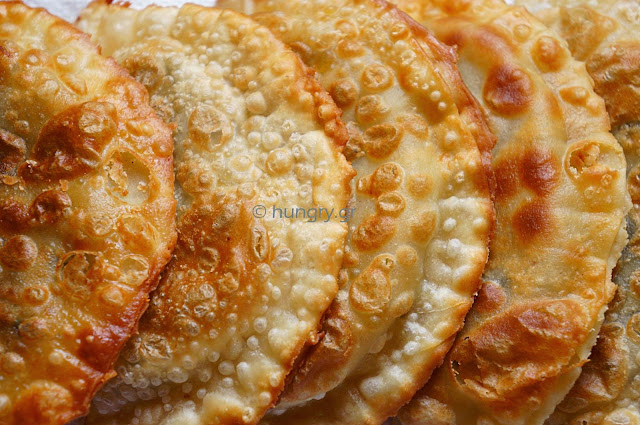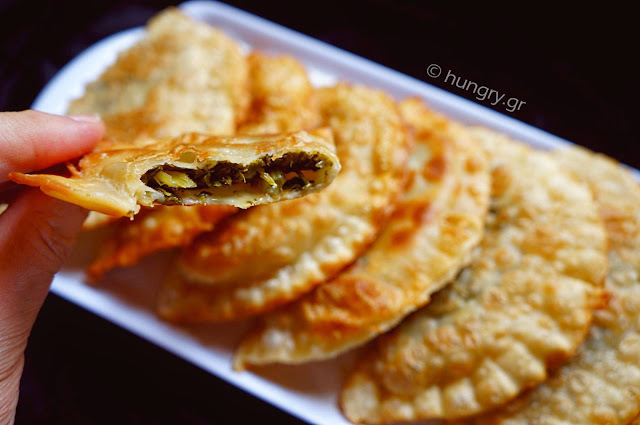
The continuation and the end of the lengthy post "Phyllo Dough & Pies" is completed here. The little pies arrive at their final destination, when the fresh fried, thin pie -which smells Greece- reach to our palate!
After we learned to we make the dough, roll the sheet and we have become experts in "dough pastry sheets" today we will learn to choose, to cook, make pies and eat the noblest, aromatic, delicious, sweet and fragrant greens & herbs of all time, the whole world.
Are these the Greek Spring! Especially after a year with so much rain the greens and green covered up rocks…
★ Mediterranean hartwort, chevrils, poppies, spurges, sorrel, leeks, onions, dill, fennel, peppermint, nettles, sonchus oleraceus, commonly all those spices, wild, sweet, edible greens, we find this time in Greek land which when cooked become the ultimate nutritional and taste dimension.
Most of us do not recognize more than 3-4 species. The variety is great and it is not easy for someone who does not live close to nature to know their name, but also to distinguish edible from inedible. Many are found in outdoor public market and grocery stores. Wherever you find them, take them and go make pies.
Yours!
After we learned to we make the dough, roll the sheet and we have become experts in "dough pastry sheets" today we will learn to choose, to cook, make pies and eat the noblest, aromatic, delicious, sweet and fragrant greens & herbs of all time, the whole world.
Are these the Greek Spring! Especially after a year with so much rain the greens and green covered up rocks…
★ Mediterranean hartwort, chevrils, poppies, spurges, sorrel, leeks, onions, dill, fennel, peppermint, nettles, sonchus oleraceus, commonly all those spices, wild, sweet, edible greens, we find this time in Greek land which when cooked become the ultimate nutritional and taste dimension.
Most of us do not recognize more than 3-4 species. The variety is great and it is not easy for someone who does not live close to nature to know their name, but also to distinguish edible from inedible. Many are found in outdoor public market and grocery stores. Wherever you find them, take them and go make pies.
Yours!
| work: 2h:30′ | time: 3h:30′ | medium: |



Ingredients (∼25 pies)
|
 Clean and wash very well the various greens and boil -apart from aromatic herbs- in hot water to boil almost completely. We test with a fork to have softened their stalk. |  Remove them in a colander and leave to drain and cool for chopping. |
 In a deep pan pour the olive oil, onions and spring onions to brown in a casserole for a while and polish. Stir occasionally. |
 In the saucepan, over low heat, add chopped in length ~2cm (~0.8in) cooked vegetables. Mix with a wooden spoon and add salt and pepper. Leave them to cook completely and evaporate whatever water there is from cooking. |
 Towards the end we add chopped all the aromatic herbs: dill, fennel, parsley, mint and leeks. These latter require very little cooking time so put them in the end. Mix well to combine with other vegetables and remove the pan from the heat. Allow to cool the filling to fill the pies. |
 Fill a plate with a bristle filling and bring it onto the workbench. |
 Prepare the phyllo, as we saw in a previous analysis, and fill each round sheet with a small amount of filling in a semicircle. |
 You close every pie/ kalitsouni, blanketing the other half of the sheet in half moon and press with a fork around it shut. |
 You place them at a silicone surface or greaseproof paper. Gather them together always covered with a towel until ready to be fried. |
 Pour enough oil in a pan and after it burns well pour 2-3 pies. |
 You fry them for a few minutes on each side and remove them to a plate covered with paper towels. |


If you want you can bake them in the oven brushing their surface with a little oil.

